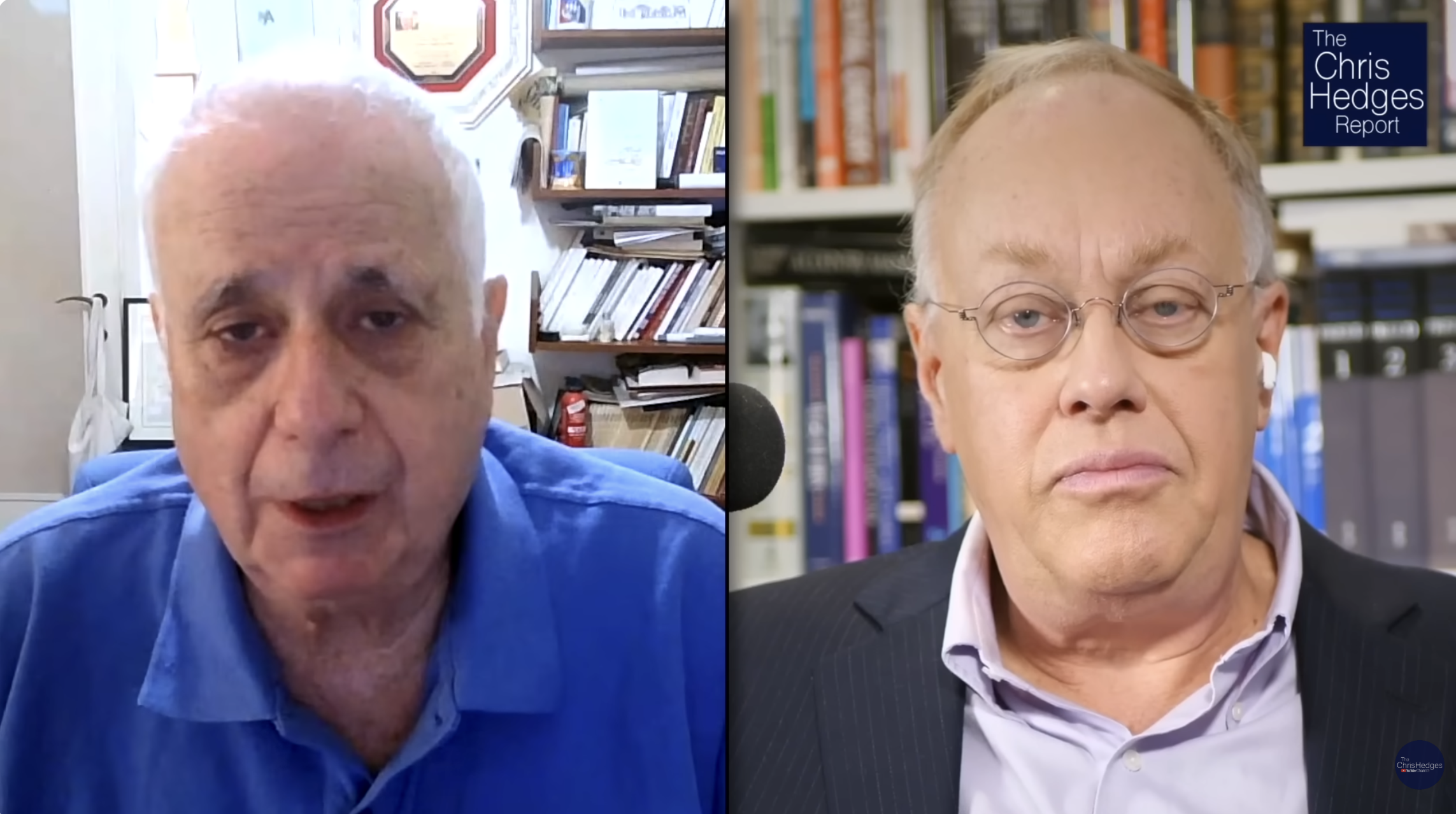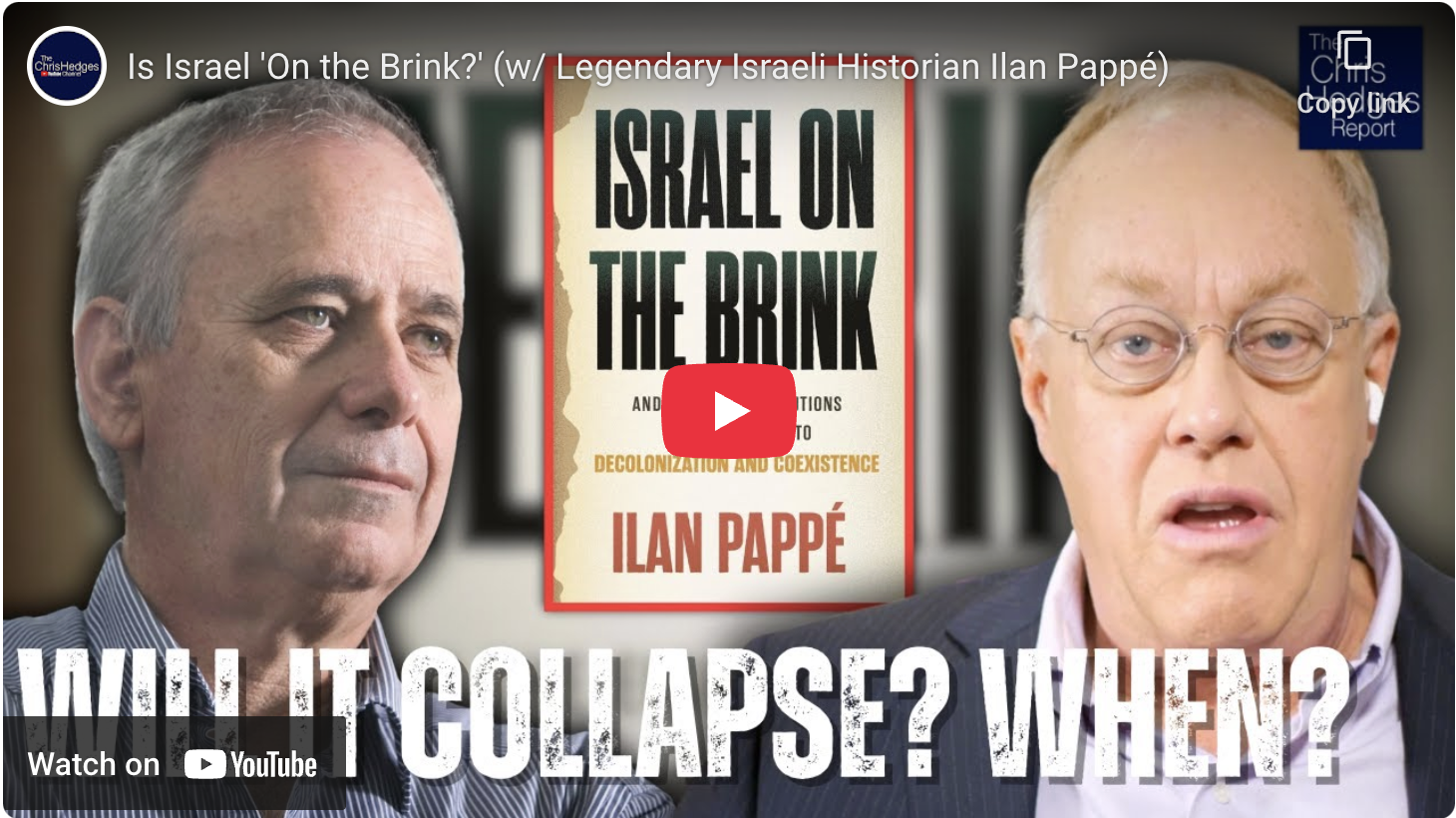This interview is also available on podcast platforms and Rumble.
Despite the demoralization and destruction produced by Israel’s two-year-long genocidal campaign on the Palestinians, Israel potentially finds itself at its weakest point in its short history.
In his new book, Israel on the Brink, renowned Israeli historian Ilan Pappé makes the case that Israel’s current path forward is unsustainable. With a combination of domestic, political, military and international pressures, Israel will continue to destabilize.
Pappé writes, “A potential fall of Israel could either be like the end of South Vietnam, the total erasure of a state, or like South Africa, the fall of a particular ideological regime and its replacement by another. I believe that in the case of Israel, elements of both scenarios will unfold sooner than many of us can comprehend or prepare for.”
Hedges and Pappé chronicle the path Israel has taken to reach this point, one of radical religious fanaticism manifesting itself in figures such as Benjamin Netanyahu and Itamar Ben-Gvir at the highest positions in government, and what the future looks like for them as well as the devastated Palestinian population.
Chris Hedges
The Israeli historian Ilan Pappé argues that Israel is imploding. He defines the current far-right government of Benjamin Netanyahu as neo-Zionist, meaning that the old values of Zionism have become more extreme, more openly racist, more supremacist and more violent. This neo-Zionist state has abandoned the incremental approach, the slow-motion ethnic cleansing of Palestinians, which characterized past Zionist governments.
It is using genocide as a weapon to empty the Gaza Strip of Palestinians and soon perhaps the West Bank. It is dominated by Jewish extremists that have turned Israel into what he calls the State of Judea, distinct from the old state of Israel. The state of Judea, run by fanatic Jewish colonists, 750,000 of whom live in the West Bank, fuses religious Zionism with Orthodox Judaism. It seeks to establish an Israeli empire that will dominate its Arab neighbors, especially Lebanon, Jordan and Syria.
The hatred for Palestinians by those who run this neo-Zionist state, the state of Judea, extends towards secular Israeli Jews. This, he argues, means that ultimately Israel will fracture, making Israel unsustainable. At the same time, as the American empire unravels, a process accelerated by the ineptitude and corruption of the Trump administration, Israel’s fundamental pillar of support will erode, forcing retrenchment by the United States, including in the Middle East.
What will the collapse of Israel mean for Israelis, Palestinians and the Middle East? Will it usher in a process of decolonization? Or will it foster even more violence, bloodletting and extremism? Will it be possible to replace Israel with a secular state, one where Palestinians have equal rights with Israelis, a country of one person, one vote? Or will Israel atrophy into a despotic theocracy, with its educated secular elite fleeing the country and its economy disintegrating under the onslaught?
Joining me to discuss the future of Israel, and his new book Israel on the Brink, is Ilan Pappé, professor of history at the College of Social Sciences and International Studies at the University of Exeter in the UK and director of the university’s European Center for Palestine Studies. His other books include The Ethnic Cleansing of Palestine, Ten Myths About Israel and A History of Modern Palestine. Let’s begin with the latest news out of Qatar, this attempted assassination of the leaders of Hamas who were apparently gathering to discuss and by all reports accept the latest ceasefire agreement.
Ilan Pappé
Yeah, Chris, thank you for having me once more on your show. It’s a great pleasure and honor to be here. I think that those of us who follow closely Benjamin Netanyahu’s policy towards the negotiations with Hamas or towards the idea of finding an exit out of the present war in Gaza, were not surprised by the attack.
In the previous cases where there was a chance for a deal, Netanyahu found non-military, if you want, ways of making this impossible. This time, because of the American involvement, it was clear that Hamas was going a very long way towards meeting the Israeli demands and therefore a deal was possible and the only way to do it was by this provocative attack on the Hamas negotiating team.
It’s not even the Hamas leadership. He attacked the negotiating team hoping that this would lead to a situation where negotiations would be a non-starter. Both the attack itself failed and also the Hamas position has not changed. They’re still willing to negotiate a deal. I think that’s one dimension of that attack.
The other dimension is what you referred to in your introductory remarks. This is the DNA of the present Israeli government, the sense that they are the rulers of the Middle East, that they are the dominant power. And it’s good every now and then to show every part of the Middle East that they have the power and the ability to do whatever they want regardless of international law or the sovereignty of Arab countries.
It is really a sense that they have that the Arab world, or at least the regimes of the Arab world, are totally at their mercy and under their submission. And I think that these were the twin objectives of this attack — one was tactical about the negotiations, but the other one was part of this hubris sense that they are now really the power in the area, which fits very well with this neo-Zionist messianic vision of reconstructing the ancient kingdom of Israel that they have read about in the Old Testament, in the Bible, thinking that they are now being able to rebuild it with the same kind of power and influence.
Chris Hedges
And just the reaction of the Trump administration, it’s hard to know what’s true. Trump lies like he breathes but he claims, of course, that he didn’t learn about it until the US military told him about it.
The warning that supposedly was delivered to Qatar, according to Qataris, began ten minutes after the bombing began. There’s the largest US airbase in the Middle East in Qatar, they certainly would have been able to read through radar systems, the approach of Israeli warplanes. How do you read the US response and the effect on the United States of this strike?
Ilan Pappé
I think this is a way of trying to cover up for what really happened. After all, it’s not only that you have the biggest American base in the Middle East, in Qatar, you have the high command of the whole region, the American high command of the whole region in Qatar. The Israeli air force would have not sent one aeroplane to that airspace without at least informing that headquarter in Qatar.
So I think that the Americans knew that this was coming. I think Trump begins to understand that Netanyahu believes that sometimes established facts are good enough in order to make sure that Trump, even if he’s not entirely happy with an action, will go along with it after it had occurred. And therefore, I do think that the Americans knew about it.
They decided not to stop it by any powerful or forceful means and hoped and they still probably believe at this moment that they have succeeded in somehow glossing over this incident as they would call it and maintain their good relationship both with Israel and Qatar.
At one point this kind of adventurous policy would not be that easy to reconcile for the Americans. It works so far because of the weakness of the Arab governments, the lack of self-respect and dignity. But they might find one day that this is even too much for them. And then this whole American game of navigating or balancing between the two different interests of the United States in the region, this balancing act may not be possible anymore in the future.















